The Nature inFocus Photography Awards received photos that captured thrilling and thought-provoking moments in the natural environment thanks to the addition of a new category. Photographers portrayed animal moments using a collection of photographs that work together to tell a story in the new category, Photographer of the Year - Portfolio, which showcased the best in visual storytelling.
This year's new features included more than just the category. The number of awards increased with the announcement of three winners and roughly five jury picks for each category.
The panel members and curator, Kalyan Varma, co-founder of Nature inFocus, presented the winning photographs LIVE on YouTube on November 25.
With that being said, if you'd love to see previous year's winners make sure to click here!
More info: natureinfocus.in | Facebook | Instagram | twitter.com | youtube.com
#1 "Fireball", Jury Selection, Young Photographer
As Alankritha photographed the Red Panda curled up in deep slumber, a hundred questions raced through her mind. The image is a scene of serenity, in stark contrast to the many threats that besiege this endangered species. Habitat loss and fragmentation, feral dogs, and occasional poaching incidents continue to threaten their existence. The young photographer puts it best, "Will the Red Panda wake up to a brighter tomorrow?" By Alankritha Kalingarayar.
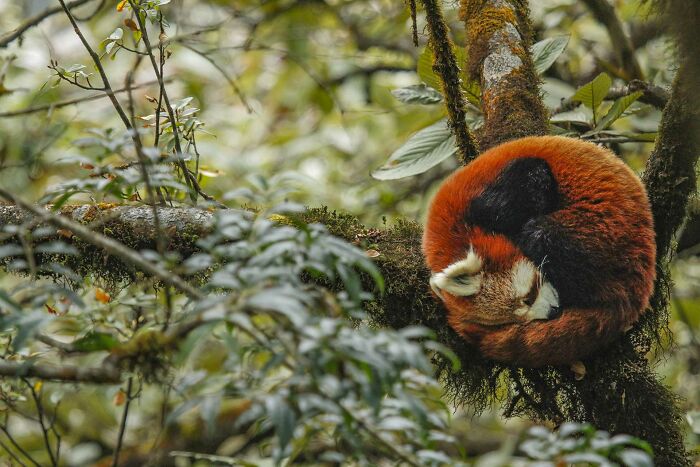
Image credits: Nature In Focus Photography Awards
Bored Panda reached out to the editor and one of the Jury members Radha Rangarajan who is part of the Nature inFocus Photography Awards We were wondering how the overall winner of the competition was picked, and here's what Radha told us, "At Nature inFocus, we normally select one overall winner from the list of winners of the main categories. However, in 2022, we introduced a new category called Photographer of the Year — Portfolio, where participants were asked to submit a series of images that work together to tell a powerful story on natural history or wildlife and environmental conservation."
#2 "Cloaked In Lilac", Jury Selection, Wildscape & Animals In Their Habitat
Yes, this is a pretty image with the tiger's stripes standing out in the middle of the purple water hyacinth flowers. But these invasive plants are notorious for displacing native plant species within water bodies while reducing oxygen levels. As seen in the image, even protected areas like national parks and tiger reserves are not immune to their impacts.
By Sanjay Nair.
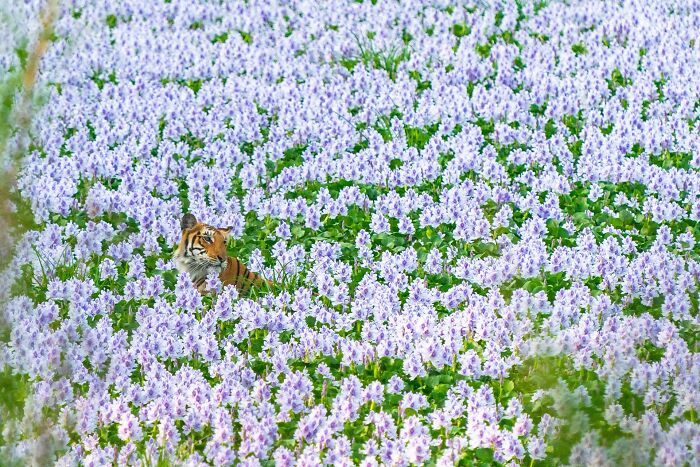
Image credits: Nature In Focus Photography Awards
#3 "Tranquillity", Jury Selection, Wildscape & Animals In Their Habitat
If you ever decide to capture serenity in one frame, here it is! Whooper Swans need ample space and spend a lot of their time swimming and foraging for food. But don't be fooled by the calmness that the image exuberates. These large birds are equally boisterous. By Lakshitha Karunarathna.
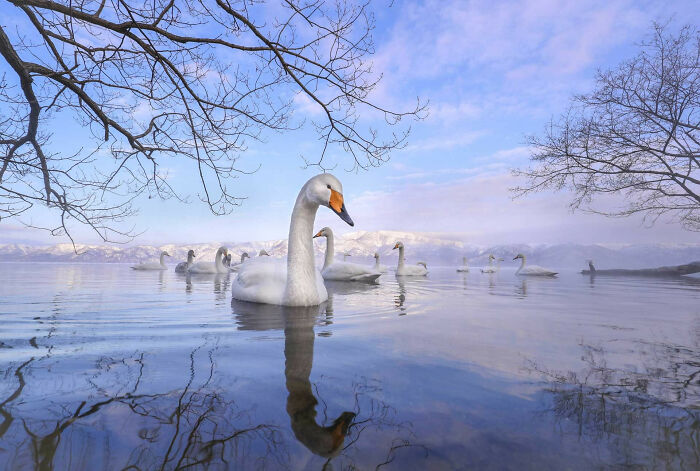
Image credits: Nature In Focus Photography Awards
"We received a couple of thousand images in this category, and the portfolios were reviewed first by an internal preliminary judging team at Nature inFocus. Shortlisted portfolios were then reviewed and scored by the jury members, based on originality, authenticity, aesthetic values, technical proficiency, and most importantly, the quality and impact of the story the images tell. The overall winner this year, Fernando Martinez Belmar, narrated a riveting story about the plight of the endangered jaguars in Mexico through stunning images."
#4 "She’s Like The Wind", Winner, Animal Portraits
A female Purple Sunbird prepares to take off from the edge of a curved coconut frond, creating the illusion that her tiny body is heavy enough to bend the leaf and use it as a launchpad to throw her into the lightness of flight. By KM Anand.
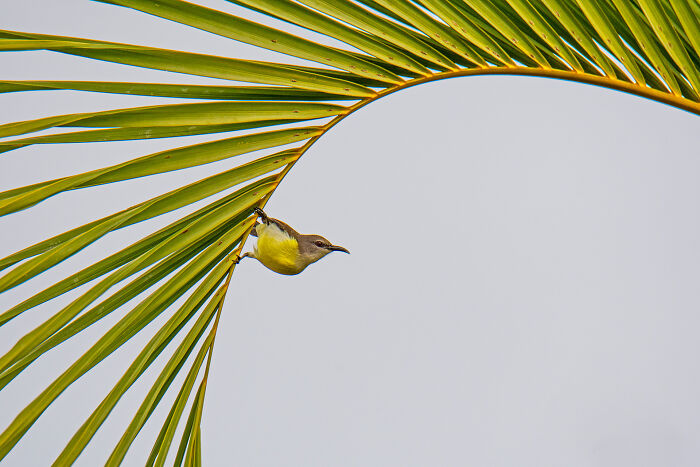
Image credits: Nature In Focus Photography Awards
#5 "Balam—the Endangered King Of The Mayan", Winner, Photographer Of The Year – Portfolio
In Mexico's Yucatan Peninsula, the Maya jungle is undergoing massive deforestation, forcing its endangered apex predator, the Jaguar, to move into human settlements. By Fernando Constantino Martinez Belmar.
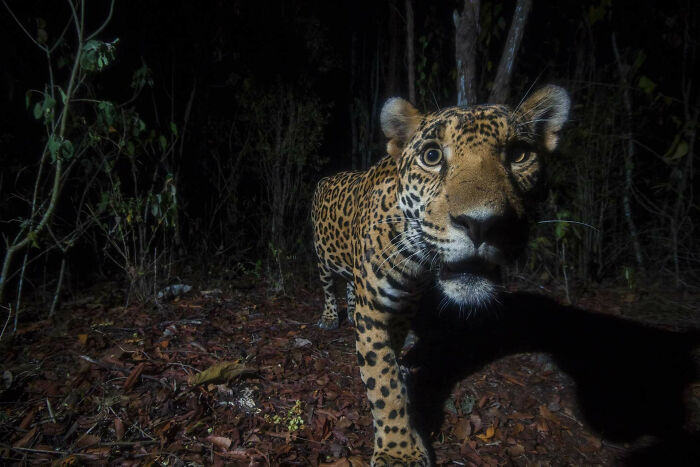
Image credits: Nature In Focus Photography Awards
The editor also told us a little bit about the main goal of the competition, "The main goal of Nature inFocus Photography Awards is to highlight and celebrate the best of photography in the space of natural history and environmental and wildlife conservation. We aim to throw a spotlight on many issues that plague the environment and its wild denizens by showcasing these photographs to the world. Photographs have the power and ability to bring about change by spreading awareness. We believe that awareness is key, because one only conserves what they know and love."
#6 "A Croc’s World", Jury Selection, Animal Portraits
This high-contrast, half-and-half image of an American Crocodile in an archipelago in southern Cuba captures the reptile in its element. Massimo spent days with a bask of crocodiles near a mangrove forest to study the currents, the light in the region, the water clarity and for the perfect opportunity to shoot a close-up against the backdrop of a blazing sun. By Massimo Giorgetta.
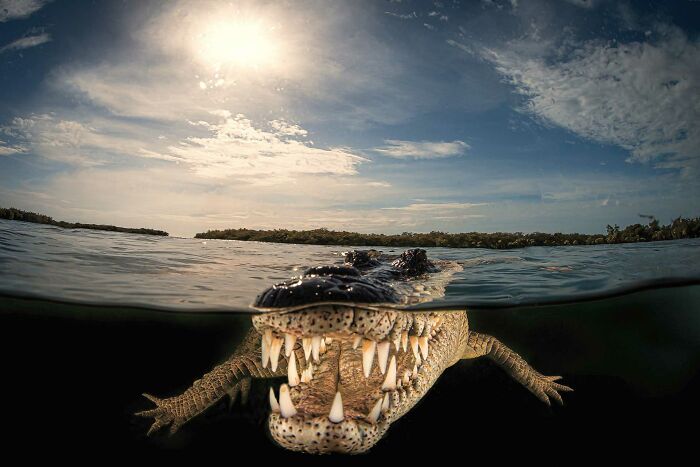
Image credits: Nature In Focus Photography Awards
#7 "Refuge In Sponge", Jury Selection, Creative Nature Photography
A Black-spotted Porcupine Fish uses a Giant Barrel Sponge as a harbour away from the current. The swirling effect is created by spinning the camera while exposing and using strobe lights to freeze parts of the frame. By Magnus Lundgren.
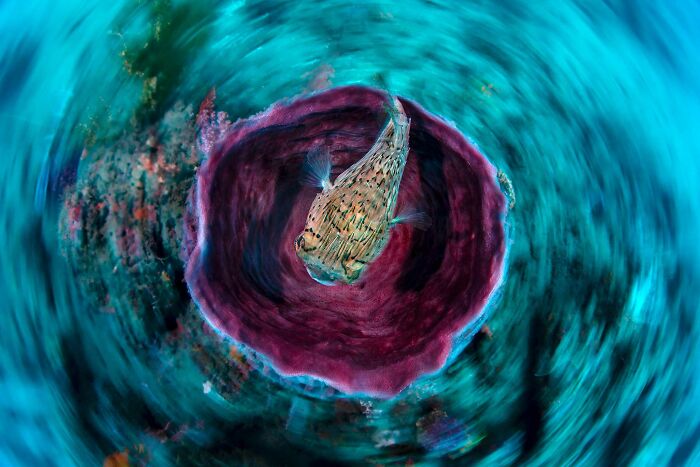
Image credits: Nature In Focus Photography Awards
The competition's website also advertises a certain festival, which got us intrigued. We took the opportunity to ask Radha to tell us a little bit more about it too.
"The Nature inFocus Festival is an annual event that brings together the community of wildlife photographers, filmmakers, conservationists, researchers, students, enthusiasts and nature travellers. The festival is a buzzing space where over a weekend, the community gets the opportunity to interact with people who love wildlife and work for the same causes. Talks, panel discussions, photography showcases, film screenings and many other interactive sessions take place.
The results of the annual Nature inFocus Photography Awards and Film Awards get announced at the event, and all the winning images get exhibited along with images that made it to the final round of judging. The Festival last took place in 2019 and has not been held during the years of the pandemic due to logistical challenges. The next edition will take place in 2023."
#8 "Wings Of Life And Death", Winner, Creative Nature Photography
At the start of the monsoon, as the first rains lash down on scorched earth, winged termites or alates emerge in huge numbers, with the singular purpose of breeding in what is known as the nuptial flight. Bright lights confuse the navigational systems of most animals, and it is common to see swarms of alates flying around street lamps. Anirban chanced upon a termite swarm near the local petrol bunk when suddenly a Black Drongo swooped into feast on the termites. The whole thing was over in 15-20 minutes. The winged termites vanished, and so did the drongo.
By Anirban Dutta.
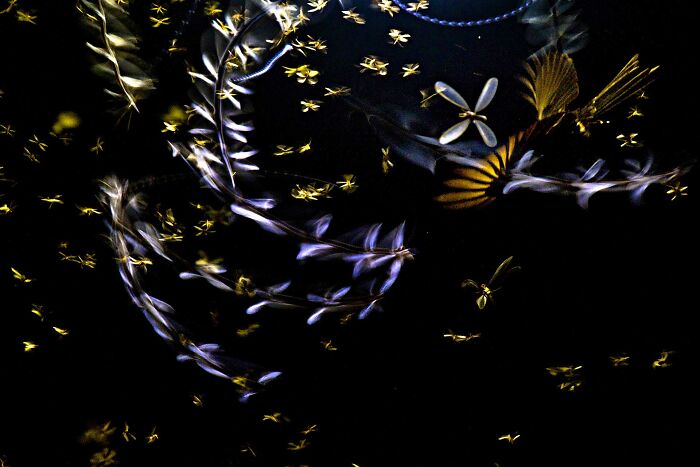
Image credits: Nature In Focus Photography Awards
#9 "Heart Of Pink", Jury Selection, Creative Nature Photography
A bird's eye view of a wetland shows a large colony of flamingos shaped almost like a heart as it charges back and forth in a tight-knit formation—a courtship dance known as marching. Alongside the busy flamboyance are quickly accumulating algal populations that rob aquatic life of precious oxygen. By Raj Mohan T.
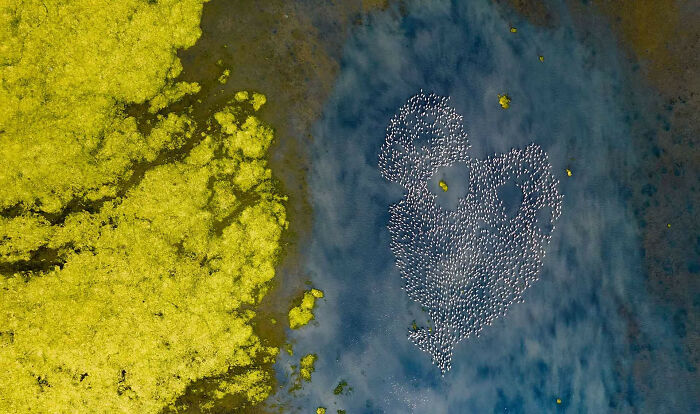
Image credits: Nature In Focus Photography Awards
We think that without any doubt, organizing a competition on this scale must not have been easy, and to prove the said statement, Radha gave us an overall timeline of how long it takes to organize something like that.
"It takes our team close to 4 weeks to put together the website and communication plan before the contest is announced. We normally keep the contest open for submissions for 3 months. It takes us about ~3 months to complete all rounds of judging, verification and deliberations and announce the results. A key element to the contest has been the grand award ceremony that takes place at the Nature inFocus Festival, along with the photography exhibition that is held at the Festival venue. In the last three years, due to uncertainties and logistical troubles that the pandemic has brought in, we haven’t been able to offer this to the participants, and that has been a challenge. We are grateful to the participants who continue to participate and submit their entries!"
#10 "Jailbreak", Winner, Wildscape & Animals In Their Habitat
Barn Owls on window sills, inside abandoned buildings, chimneys or even in a mall! We have seen them all. The most widespread land bird species does not take its title lightly. But here, the bird seems to be seeking refuge in a rather unusual location. The camera trap image shows a Barn Owl flying into an abandoned Mumbai Police van. Well, if you are looking for a safe habitat!
By Kapil Sharma & Yogendra Satam.
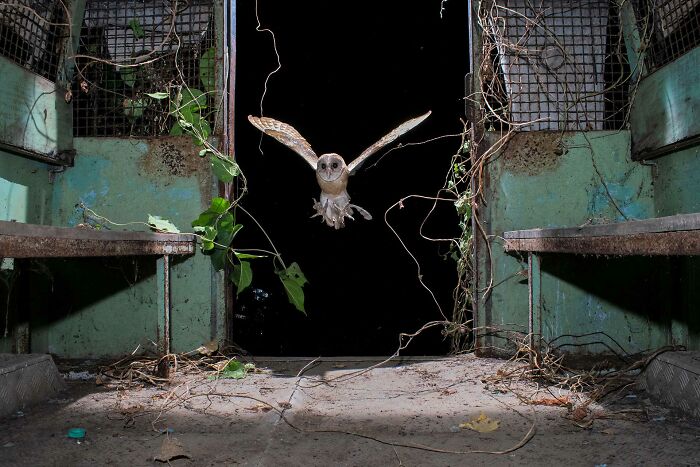
Image credits: Nature In Focus Photography Awards
#11 "Termite Control", Winner, Animal Behaviour
Look up images of hyenas hunting and you will most likely find scenes of a pack feeding on carcasses of animals like antelopes, wildebeest or even lions! Yep, a pack of hyenas can take on some large animals. But here, a Spotted Hyena has climbed on top of a termite hill, to make the most of what was available. What can we say? Some days you fight, and some days you termite! By Mangesh R Desai.
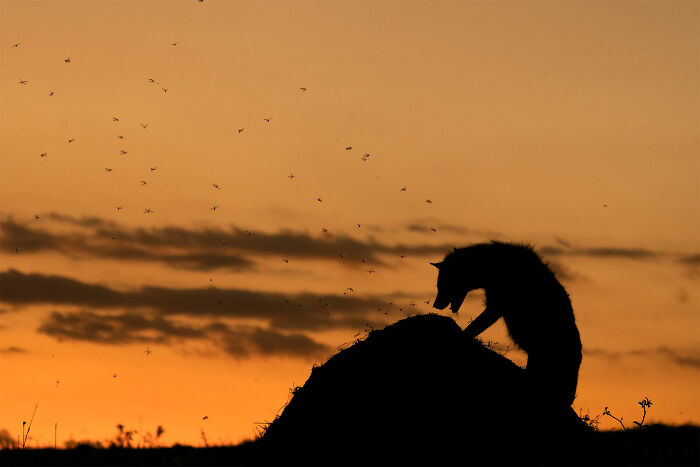
Image credits: Nature In Focus Photography Awards
Given how many photographers from all over the world participated in the contest, we hoped that Rangarajan could share a little secret with us as choosing favorites from over 21 thousand pictures must not have been easy for the judges. Bored Panda asked Radha if by any chance he and the judging team had any personal photos they really liked even if they didn’t make it to the final categories.
"Judging is very subjective and personal by nature, so this is bound to happen! I can’t speak for the rest of the judging team, but over repeated viewings of the entries, I did have a few favourites that I kept rooting for, quietly. For various reasons, they didn’t earn enough scores to make it to the final round, but they will remain close to my heart!"
#12 "Heat Tasting", Jury Selection, Animal Portraits
Sandeep captured the flick of an Anamalai Pit Viper's tongue using the rear curtain sync mode, whereby the flash is fired at the end of the exposure, thereby capturing the complete motion trail. Pit vipers stick out their tongue to collect scents, and when drawn back in, it comes in contact with the Jacobson's organ on the roof of the mouth, helping in smell detection. By Sandeep Das.
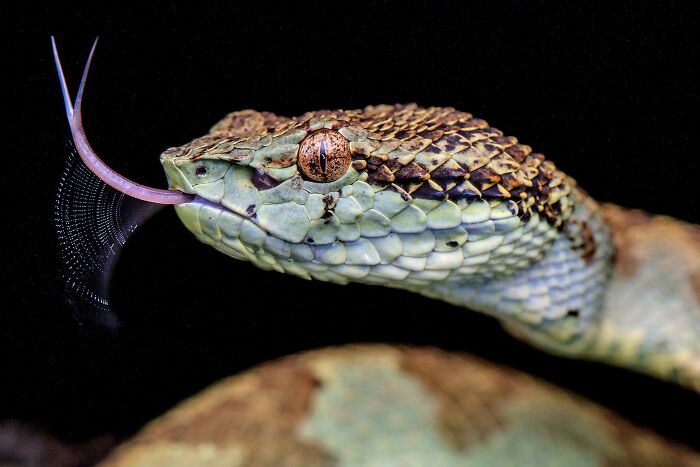
Image credits: Nature In Focus Photography Awards
#13 "Let It Snow", Jury Selection, Wildscape & Animals In Their Habitat
The winter wonderland is vastly different from what the Sika Deer ideally prefers: forest areas with dense understories. Nevertheless, the image is striking for several reasons—the thick blanket of snow that turns everything it touches to white and a lone deer gently seated on what looks like soft pillowy snow. By Philippe Ricordel.
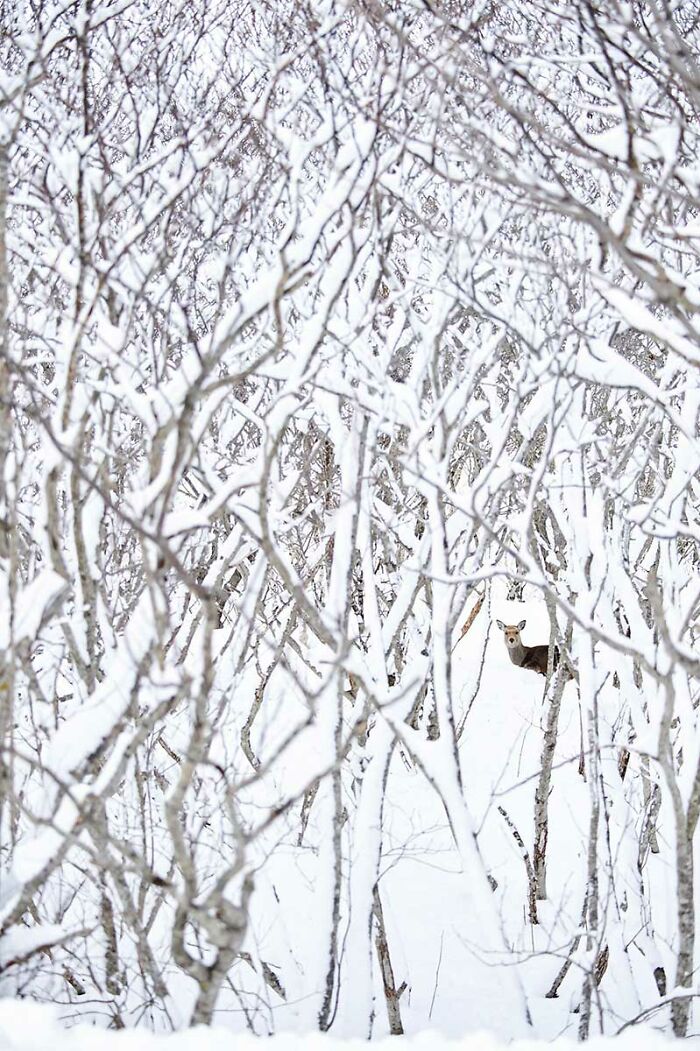
Image credits: Nature In Focus Photography Awards
#14 "Where The Giants Roam", Winner, Animal Portraits
Elephants are a common sight along the river and in the paddy fields of Sri Lanka's north-central province. The farmers are happy to allow these gentle giants to enter their paddy fields after harvest. But they do everything possible to chase away the pachyderms during the crop season. This aerial shot of a massive tusker beautifully captures its larger shadow against the riverbank decorated with the footprints of his herd. By Lalith Ekanayake.
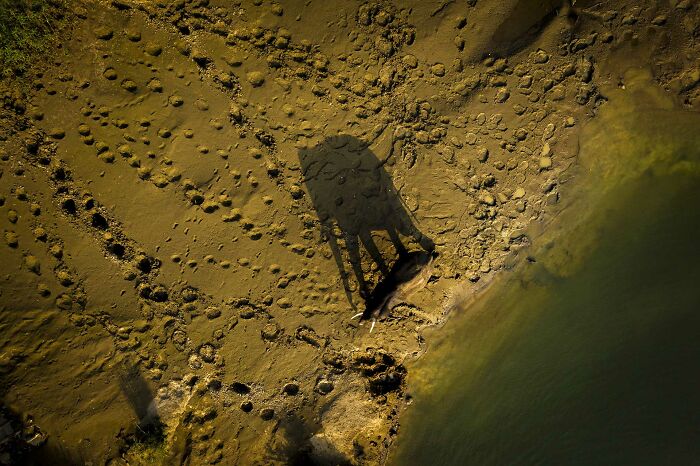
Image credits: Nature In Focus Photography Awards
#15 "A Thorny Issue", Winner, Conservation Focus
The salt pans of the Little Rann of Kutch play host to a diverse range of fauna. A growing feral dog population in the region has become a significant cause for concern, as portrayed in this image of two dogs attacking an Indian Crested Porcupine. It is also a potent reminder that feral dogs are not selective and affect wildlife across species.
By Kapil Sharma & Yogendra Satam.
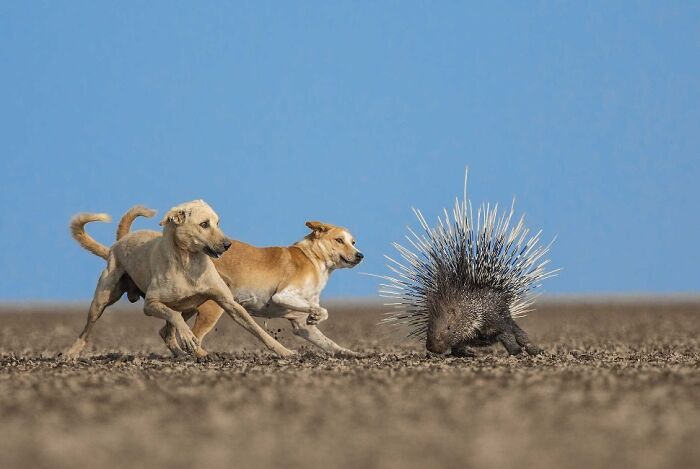
Image credits: Nature In Focus Photography Awards
#16 "Mohun In Danger", Jury Selection, Photographer Of The Year – Portfolio
A critically endangered chelonian, the Black Softshell Turtle has found an unlikely home in the temple ponds of Cooch Behar, West Bengal. Find out how this turtle is surviving in this urban landscape. By Ripan Biswas.
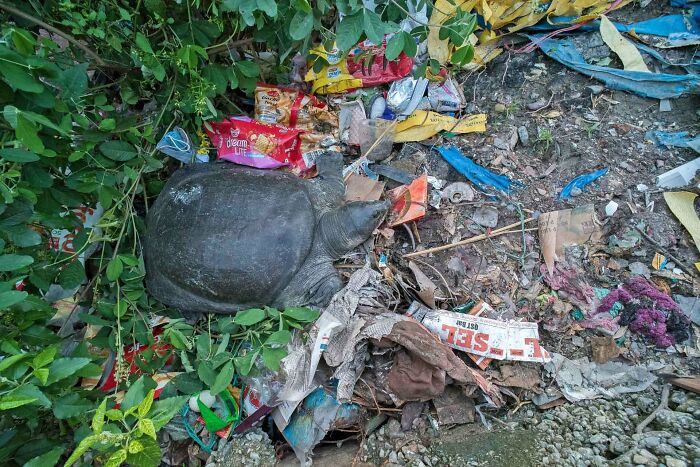
Image credits: Nature In Focus Photography Awards
#17 "Fox In The City", Winner, Wildscape & Animals In Their Habitat
The beauty of snow-clad rooftops and backyards with just a hint of fox in the midst of it all. The Red Fox sure seems in its element in the suburbs of London, exemplifying the canid's ability to adapt to a diverse range of habitats. From mountains to forests to people's backyards, for the Red Fox home is many things. By Tapas Biswas.
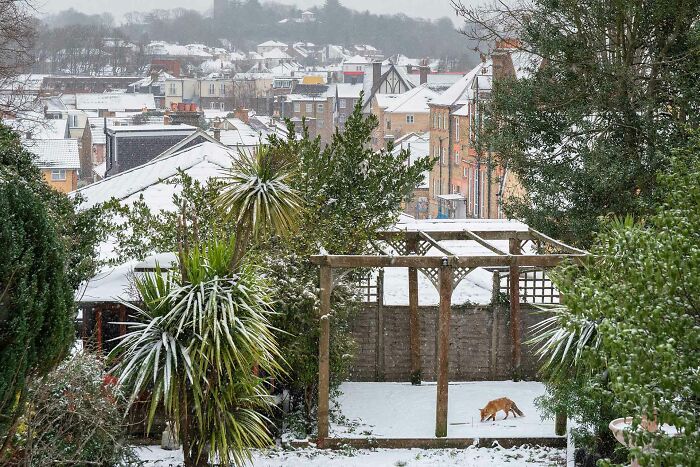
Image credits: Nature In Focus Photography Awards
#18 "Ka Pow!", Jury Selection, Animal Behaviour
Here's how it works in the world of the Grey-headed Swamphen. When breeding groups encounter an intruder in their territory, the first displays of threat include raising wings, bending down and flapping tails. If that doesn't work, then it's time to be a bit more dramatic. The opponents fly at each other feet-first and peck their way to victory. By Karthikeyan Ponnambalamoorthy.
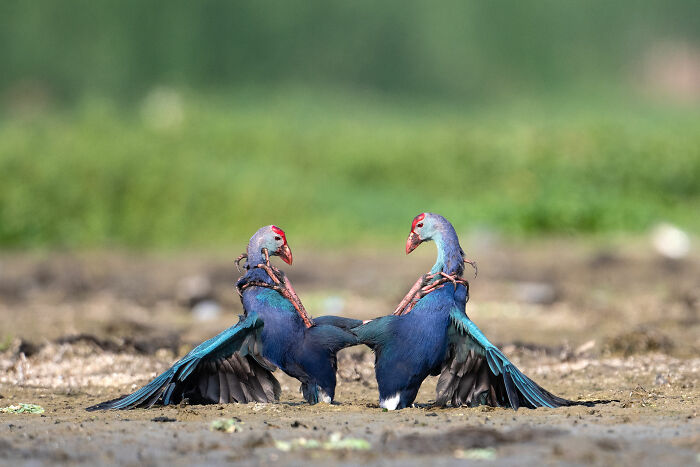
Image credits: Nature In Focus Photography Awards
#19 "Burnt Violet", Jury Selection, Creative Nature Photography
The Sri Lanka Junglefowl is an endemic species that is a common sight across the island nation. A stunning burnt orange plumage with dark streaks, and an iridescent, glossy black tail, junglefowls are a sight for sore eyes. This close-up photograph of its wing is a confounding play of colors, almost hypnotizing, if not for a certain photobombing winged friend. By Ashane Marasinghe.
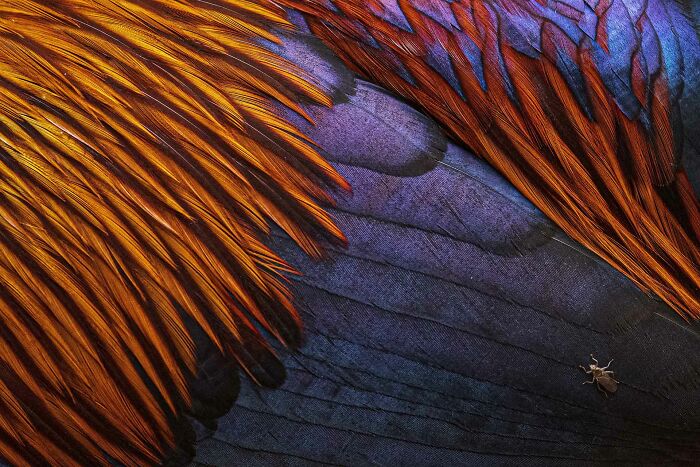
Image credits: Nature In Focus Photography Awards
#20 "Jaws-Ome", Winner, Animal Portraits
The Caribbean Reef Shark is an impressive and fast hunter. With the help of a long shutter speed, two underwater strobes and some speedy camera movement, the photographer created this breathtaking portrait of the dynamic apex predator. Sharks are a protected species in the Bahamian reefs, like in many other parts of the world's oceans, yet 80-100 million sharks get killed every year. A strong market demand for shark fins is the main driver. In order for shark conservation to be a success, Magnus believes that there needs to be an understanding that living sharks hold a greater value than dead ones. By Magnus Lundgren.
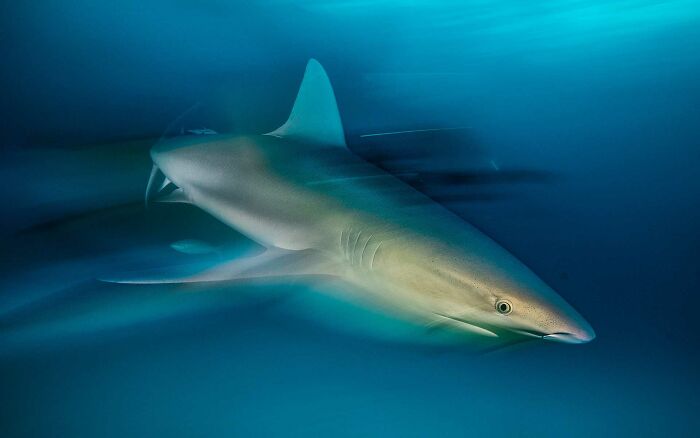
Image credits: Nature In Focus Photography Awards
#21 "Chaos Theory", Winner, Conservation Focus
While it's often difficult to decode a conflict situation, one thing is for sure—fear fuels it from both ends. On spotting a tigress resting near the paddy fields, the villagers of Borsola near Orang Tiger Reserve panicked and began pelting stones at the felid. They also set fire to dry paddy, further agitating the animal. While the tigress ran amok, so did the people trying to flee the area. One villager tried to confront the animal and was inflicted with minor injuries. The tigress eventually retreated into the forest. The image portrays the ground realities of human-tiger conflict and emphasises the need for empowering local communities to manage these situations. By Nejib Ahmed.
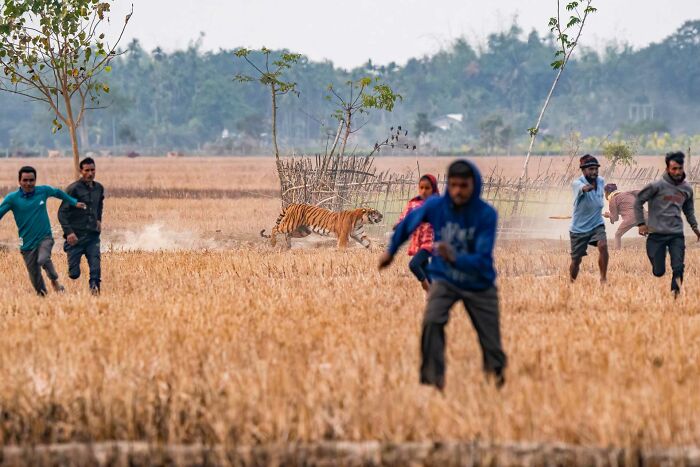
Image credits: Nature In Focus Photography Awards
#22 "Aarey’s Cats", Winner, Wildscape & Animals In Their Habitat
The camera trap image portrays the peaceful coexistence of leopards with humans in Mumbai’s Aarey Colony. The felids reside in the adjacent Sanjay Gandhi National Park and often visit the neighboring areas in search of prey. Here, a lactating leopardess is seeking refuge from the rains in an abandoned house located within a village of the Warli community. By Kapil Sharma.
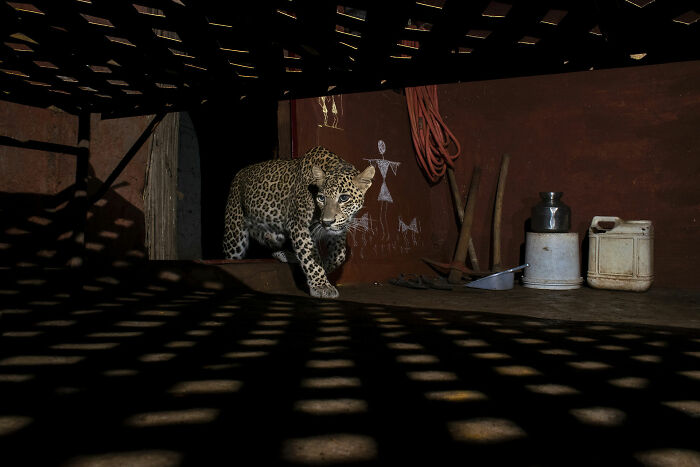
Image credits: Nature In Focus Photography Awards
#23 "Dance-Off!", Jury Selection, Animal Behaviour
When male Stream Rubies engage in a territorial battle, it’s hard to discern if they are fighting or dancing. The damselflies hardly touch each other, moving instead in a synchronous manner as they try to oust their rival in a battle of strength. The fight goes on until one of the two accepts defeat and, well, buzzes off. The rapid movements of the damselflies are hard to freeze on camera, making this a picture-perfect action frame! By Ripan Biswas.
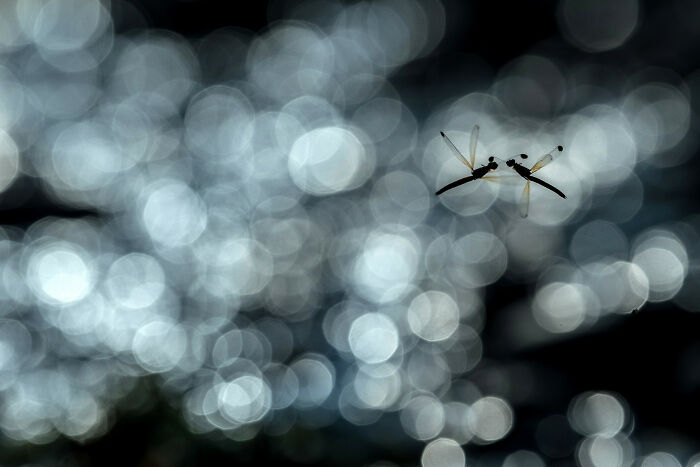
Image credits: Nature In Focus Photography Awards
#24 "The Seven Moons Of Sahara", Winner, Creative Nature Photography
The Horned Desert Viper or Saharan Horned Viper is one of the most commonly seen snakes in the North African and Middle Eastern deserts. This stunning silhouette against the city lights illustrates the signature 'horns' of the reptile, its most distinguishing feature. The so-called horns are a single scale present above each eye. By Kai Kolodziej.
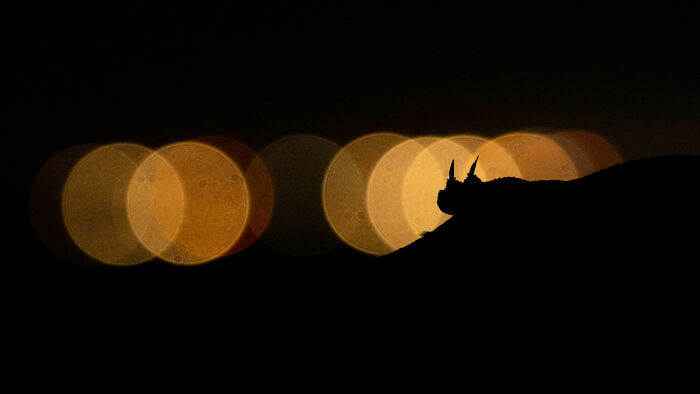
Image credits: Nature In Focus Photography Awards
#25 "Higher Up The Food Chain", Winner, Young Photographer
Fill in the blank. When the bats are out to feed, the hawks are out to…..? Jomtup observed the bats leaving their caves every evening in order to feed. Around the same time, the hawks would emerge to capture their prey—the bats. Being opportunistic feeders, hawks eat everything from rodents, small birds, and insects to bats! By Jomtup Charoenlapnumchai.
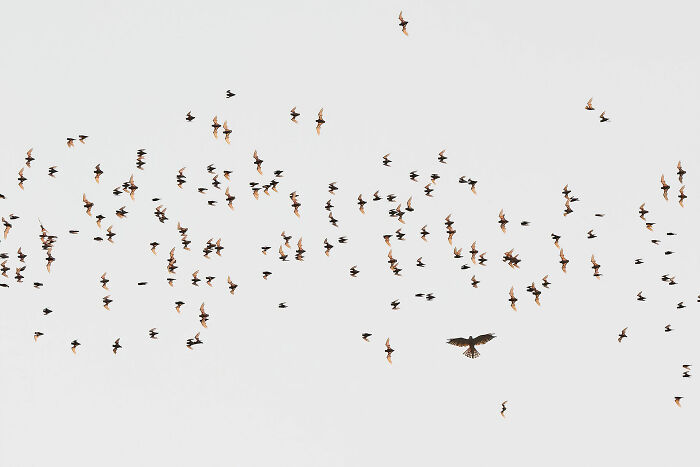
Image credits: Nature In Focus Photography Awards
#26 "Out For A Duck", Winner, Animal Behaviour
Monitor Lizards will eat almost anything. Fish, insects, birds, crabs, snakes—you name it! They even scale trees to raid nests or capture squirrels. But it's not every day that you find a giant lizard holding a Lesser-whistling Duck by its neck. Lesser-whistling Ducks are known to build nests in tree cavities and on the branches of large trees. Sometimes, even high up on a tree is just not high enough! By Ratheesh Rajan.
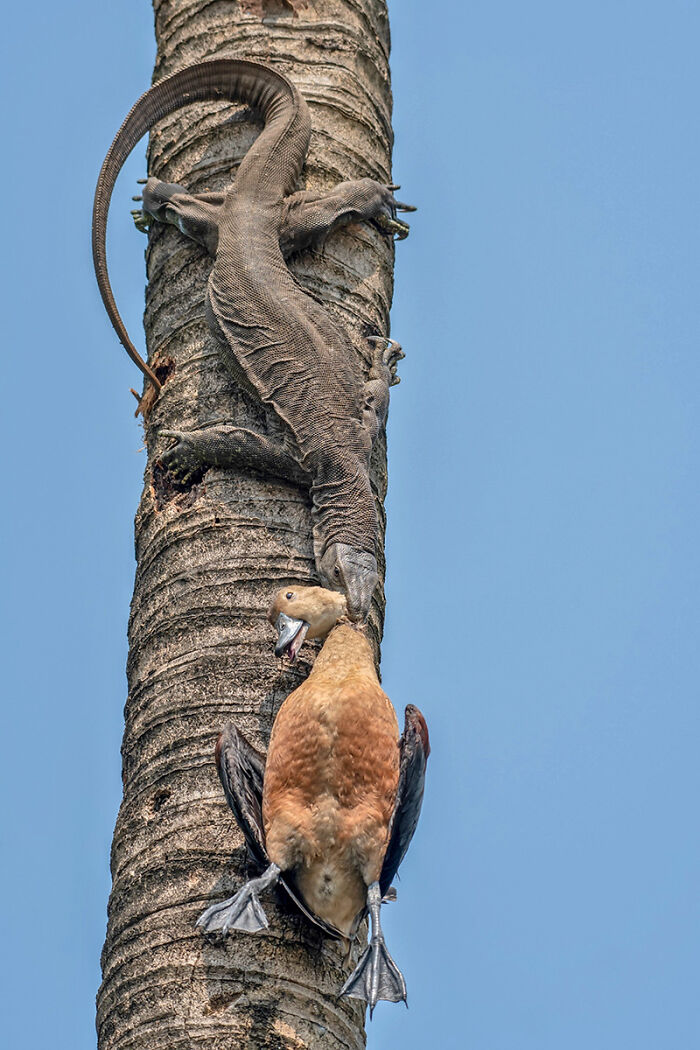
Image credits: Nature In Focus Photography Awards
#27 "Fire Alarm", Jury Selection, Conservation Focus
A quick fix or a cry for help? For the people of Parvathipuram, wild elephants are a common sight. Coexisting with them for about a decade, the villagers have come up with their own systems to not get in the way of the gentle giants. There are hundreds of houses in the region and no street lights, which makes it difficult to navigate the landscape especially at night time. To avoid encounters they use fire torches to signal their presence. The image represents how we often overlook the importance of infrastructure in conflict-prone areas. By Sanjay Kothapalli.
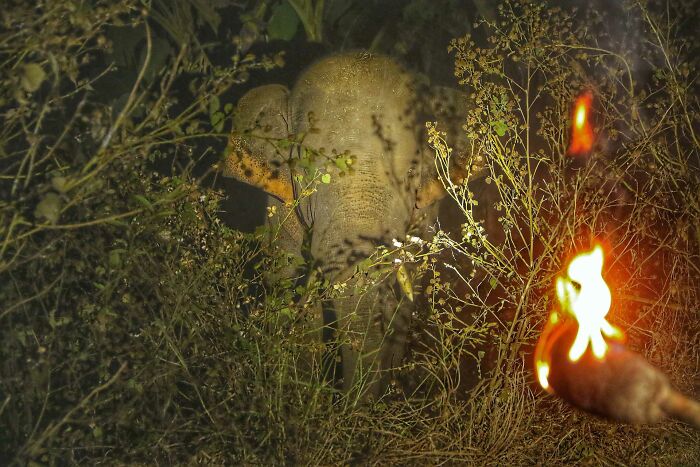
Image credits: Nature In Focus Photography Awards
#28 "Plastic Home", Jury Selection, Conservation Focus
A Bagworm Moth caterpillar builds a protective shell with the resources it has around it. Normally, this would include twigs, leaves and other natural debris. But here, the caterpillar has turned to plastic waste. The image highlights how rampant plastic pollution is and why it is crucial that we address the issue. By Amith Kiran Menezes.
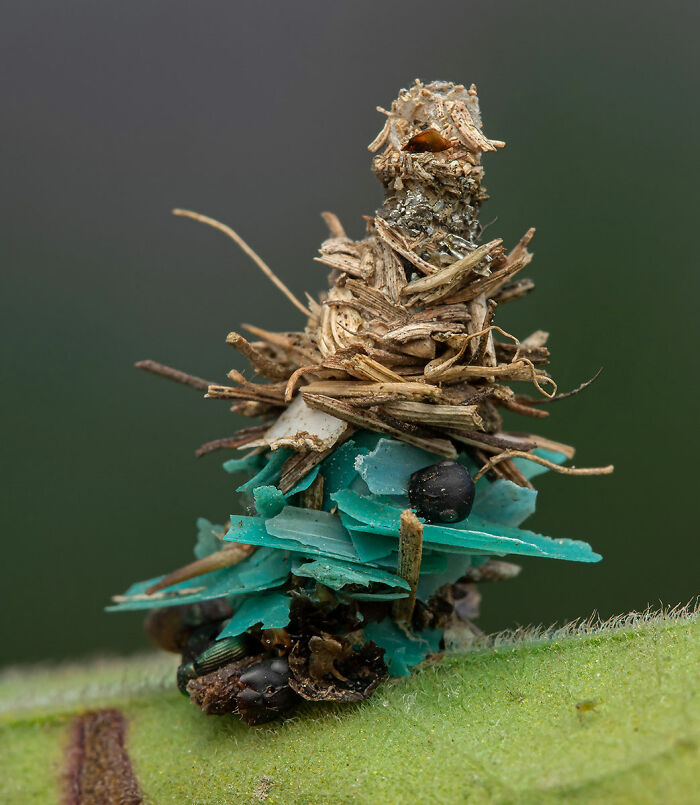
Image credits: Nature In Focus Photography Awards
#29 "A Full Meal", Winner, Animal Behaviour
If you think about it, it's quite a conundrum for sea snakes. These marine serpents are surrounded by their prey, but in a world of coral reefs, rock crevices, and quick maneuvers, to make an actual catch requires additional skills. Sea snakes are highly venomous and let their bite do most of the work. Here, a Striped Sea Snake latches onto its catch, making for rare documentation of the reptile in action in the open sea. By Joshua Barton.
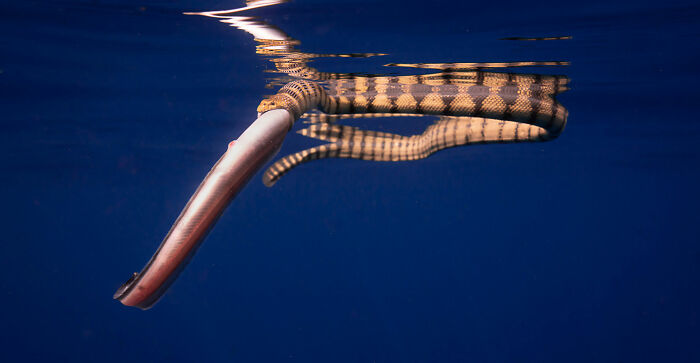
Image credits: Nature In Focus Photography Awards
from Bored Panda https://bit.ly/3VBQOC3
via Boredpanda